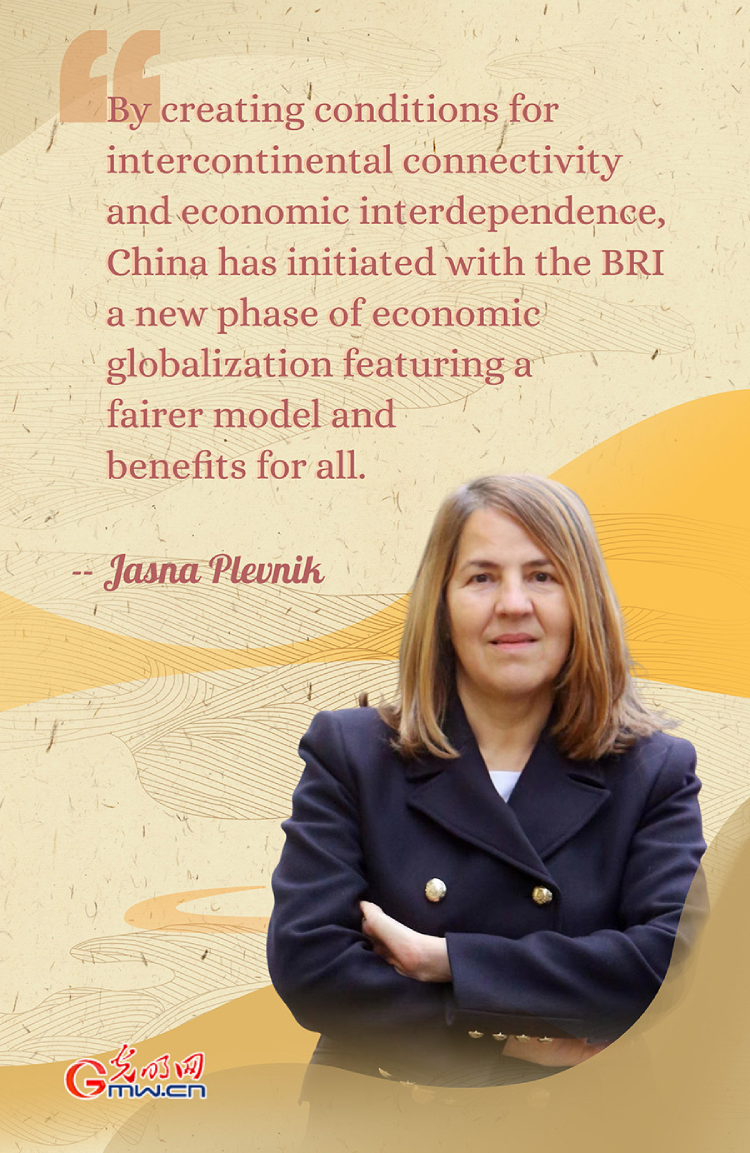


Over the past 10 years or so, jointly constructing the Belt and Road has brought fruitful results in boosting trade and investment between China and the Central and East European Countries (CEEC), which have given new dynamics to the economic development of the region, said Jasna Plevnik, president of the Geoeconomic Forum Croatia, in a recent interview with Guangming Online.
Today, the values and effects of the BRI are beyond regional, she said, in the face of the intensified anti-globalization sentiment, they are an important hedge against the US strategy of “decoupling” and bloc politics.
By creating conditions for intercontinental connectivity and economic interdependence, “China has initiated with the BRI a new phase of economic globalization featuring a fairer model and benefits for all”, Plevnik noted.
China-CEEC cooperation under BRI born palpable results
In the past decade, the synergy of the the Belt and Road Initiative and the China-CEEC cooperation have led to strengthening trade ties between China and Europe, Plevnik said.
She invoked that the trade volume between China and CEE countries has significantly increased over the last ten years by 142.6%, reaching US $136.2 billion in 2021, according to Chinese Ambassador Jiang Yu, the new Special Representative of the Ministry of Foreign Affairs for China-CEEC Cooperation.
The tightening relations have been promoted through increasing institutions, associations, networks and mechanisms established within the China-CEEC model, Plevnik said. As the BRI was comprehensively implemented, new momentum has been injected into the all-round, multi-level mutually beneficial cooperation between the two sides.
“A significant achievement of the BRI in Europe is that all CEE countries and the majority of EU members are part of the Initiative, and all share similar goals to attract more of China's direct investments, become a ‘gate’ or ‘bridge’ for China's goods and services to the European Union, and EU goods and services entering China,” she said.
In central and eastern Europe, Chinese investments are progressing in Bosnia and Herzegovina, Croatia, North Macedonia, Montenegro, Serbia, and Slovenia, while Bulgaria, the Czech Republic, Hungary, Poland, Romania, and Slovakia have attracted the largest share of Chinese FDI, she added. In fields of infrastructure and education, Chinese investments have born palpable results of connectivity and brought new dynamics to the development of the region.
China-CEEC's relations are based on the market principle of supply and demand, not geopolitics, Plevnik noted, however, political pressure on the cooperation mechanism is on the rise in Europe which is primarily caused by America's pressure.
BRI to promote more equitable, beneficial economic globalization
The recently concluded 20th National Congress has reaffirmed China’s rejection to Cold War mentality, geopolitical conflicts, and deglobalization, seeing them as opposed to the trend of the times and people's expectations, Plevnik noted. Today, the BRI's values, projects, and influence absolutely can oppose the dangerous ideas of the US of "decoupling" the world, she added.
“Decoupling is nothing more than another word for deglobalization that the US uses”, she said. “As China gets rich, technologically advanced, and invested in the West a lot, Washington started to see China as too much globalized and involved in global governance, and here lies its interest in strengthening politics for regionalization of economic globalization and decoupling.”
The expert stressed that the essence of economic globalization lies in economic interdependence among countries. “The crucial problem has never been too much economic interdependence, but inequality. The world needs fairer economic globalization instead of returning to trade blocs.”
Over the past decade, the BRI has focused on creating conditions for the growth of intercontinental connectivity and economic interdependence. Many countries in the world have become partners within the framework with goal to be linked with the economic land and maritime main corridors and sub-corridors of the BRI. The Initiative is also open to third world countries as well as regional and global organizations and global companies.
Plevnik noted that China has initiated with the BRI a new phase of economic globalization that has been understood in Asia, Africa, and Europe as a fair model of economic globalization capable to diminish the rising gap between the rich and the poor.
“I see the BRI's focus on more equality and global prosperity in building economic interdependence relations among partners as the Chinese characteristics which can make economic globalization better for all countries,” she said.

点击右上角![]() 微信好友
微信好友
 朋友圈
朋友圈

请使用浏览器分享功能进行分享
